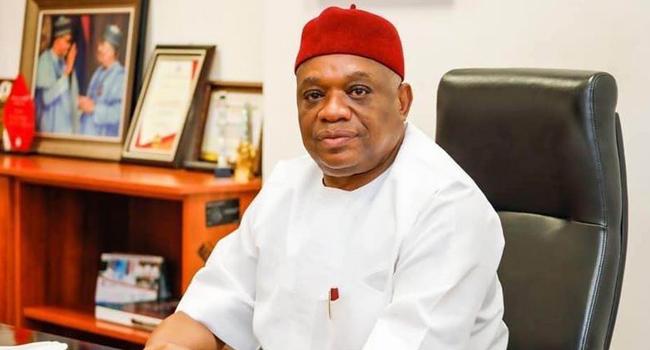Explore Our Bill Payment Services:

- Biography
- Nigeria
Orji Uzor Kalu: Biography, Net Worth And Business Career
Some names echo through Nigeria’s corridors of business and politics, sparking both admiration and heated debate. One of such names is Orji Uzor Kalu — a man many see as a symbol of sheer determination, ambition, and resilience. Love him or criticize him, one thing is clear: Kalu’s story is not a tale of luck but of courage, strategy, and a relentless drive to rise beyond limitations.
Today, he is known as a billionaire businessman, media mogul, former governor, and influential senator. But his journey started far away from the glitter of power — in the gritty streets of trade and small hustles. This is the human story of a man who turned a modest beginning into an empire that spans finance, media, oil, shipping, and international trade.
Humble Beginnings: The Making of an Entrepreneur
Born on April 21, 1960, in Abia State, Orji Uzor Kalu grew up in a culture known for enterprise and trading excellence. As a young boy, he wasn’t one to sit idle. While many teenagers were still dependent on their parents, Kalu was already experimenting with business ideas. In one popular story about his youth, he borrowed a small amount — just $35 — from his mother to venture into palm oil trade. With this capital, he purchased palm oil in the East and sold it in the North, making profit and reinvesting into more trades.
This wasn’t just about money — it was his first taste of risk, logistics, and market dynamics. It also revealed a deeper trait that would follow him throughout life: the ability to spot opportunity where others saw limitations.
Education, Rebellion, and the Call of Business
Kalu attended Christ the King School in Aba and Government College, Umuahia. He later continued at Barewa College in Zaria — an institution known for shaping many Nigerian leaders. He then enrolled at the University of Maiduguri to study Political Science. However, fate had other plans.
During the era of student protests, the “Ali Must Go” movement led to unrest across campuses. Kalu was outspoken and deeply involved in student activism. Eventually, he was suspended. Rather than see this as a setback, he redirected his energy into business, taking it more seriously.
He would return years later to complete a degree at Abia State University and also enrolled in executive business programs, including training at prestigious institutions. But everything about his mindset suggested that real business lessons were being learned in the marketplace, not just in classrooms.
The Birth of SLOK Holdings: Building a Business Empire
Many entrepreneurs dream of empires. Kalu built one.
He launched SLOK Holdings, a name that would later become associated with multiple industries across Nigeria and beyond. SLOK started small — rooted in commodities and furniture distribution — but with time, it evolved into a powerful conglomerate.
From Furniture to Heavy Manufacturing
Kalu expanded from trading into Ojialex Furniture Company. From there, he explored manufacturing, creating units that produced not just furniture but paper products, industrial materials, and household essentials. The strategy was simple: find a need and build a supply chain to meet it.
Oil, Trading, and Shipping
With success in manufacturing, he diversified into petroleum trading and shipping logistics, sectors known for high risk but high reward. Many business people shy away from such volatile territories — Kalu leaned in boldly, leveraging connections and strategy to establish a footprint in energy trade.
Banking and Financial Impact
At just 33 years old, he became the head of a banking institution, demonstrating that his influence was growing beyond physical goods into finance. Through acquisitions and capital management, he made significant moves in Nigeria’s financial landscape.
Media Influence
Understanding the power of information, Kalu ventured into media, becoming Chairman of major Nigerian newspapers, including The Daily Sun and The New Telegraph. This move was strategic — controlling media meant controlling narratives, especially in politics and public perception.
African Expansion
SLOK would not remain confined to Nigeria. Over time, the company extended operations to countries such as Ghana, Liberia, South Africa, Togo, Guinea, and the United Kingdom. This ambition to scale globally set him apart from many business leaders who remained local.
Politics: Power, Controversy, and National Reach
Success in business often draws attention — and sometimes, it draws one toward politics. For Orji Uzor Kalu, politics became another arena to express influence and drive change.
Governor of Abia State
Kalu was elected Governor of Abia State in 1999 and served two consecutive terms, staying in office until 2007. His time as governor redefined his national presence. While some applaud his bold administrative style, others criticize certain decisions — but no one denies that he left a mark.
Senator and Power Broker
He later contested and won a seat as Senator representing Abia North, where he remains an active voice in national matters. His role goes beyond legislative duties — he is seen as a political strategist with deep connections across power blocks in the country.
Party Movements and Political Strategy
Throughout his career, he has shifted political affiliations, moving from PDP to forming his own party — PPA — and later aligning with APC. These moves reflect a leader who understands timing and negotiation in the world of politics.
Legal Battles and Controversies
No power journey in Nigeria comes without storms. Kalu faced a major legal battle when he was convicted in 2019 on allegations related to mismanagement of funds during his governorship. He was sentenced to 12 years in prison. However, in 2020, the Supreme Court overturned the conviction, ordering a retrial.
This episode shaped public opinion — supporters saw it as political persecution; critics saw it as accountability. Yet, by surviving that storm and returning to public office with even stronger influence, Kalu demonstrated resilience many find remarkable.
Net Worth: Between Billion-Dollar Estimates and Mystery
Trying to determine Orji Uzor Kalu’s exact net worth is like trying to track a wave in the ocean — constantly moving. His wealth is spread across private companies, international trade networks, manufacturing assets, real estate, and media.
Public estimates place his net worth between $1 billion to $3.2 billion, positioning him comfortably among Nigeria’s richest individuals. Some lists previously placed him at $330 million, while other economic analysts argue that his diversified holdings likely push him past the billion-dollar mark.
The truth? His businesses operate through private channels, making formal valuation nearly impossible. What is clear, however, is that Kalu controls a serious economic network with long-term cash flow potential, not just flashy figures.
Strengths That Shaped His Rise
-
Diversification – He never stayed in one lane; when one industry slowed, another was rising.
-
Media Control – Owning newspaper outlets gave him public reach and narrative power.
-
Political Intelligence – He learned how to balance business interests with policymaker relationships.
-
Crisis Survival – Whether suspension from school or legal battles, Kalu consistently bounced back.
Challenges and Risks That Shadow His Legacy
-
Legal and ethical questions continue to be raised around his wealth and politics.
-
Reputation battles — In a divided political climate, perception shifts quickly.
-
Succession planning — As with many empires, the true test will come after the founder steps back.
-
Policy instability in Nigeria — Currency volatility, supply chain disruption, and governance issues can threaten even strong enterprises.
Legacy: What Will Outlive the Man?
There is a difference between being wealthy and being influential. Wealth can be inherited or lost — influence is earned over decades. Kalu has both, but what people will remember most depends on what happens next.
If his businesses evolve, create jobs, and remain ethical and impactful, he could be remembered as one of Africa’s most strategic business architects. If controversy outweighs contribution, critics will define his story differently.
What stands out, is that he rose from a $35 trade to a billion-dollar conversation. That alone makes his story a lesson in vision and determination.
Final Thoughts: The Man, The Power, The Possibility
Orji Uzor Kalu’s life proves that beginnings do not determine outcomes. From trading palm oil in his teenage years to owning multiple companies across continents and holding powerful public office, his journey reflects the complexity of ambition.
He has known success, scandal, triumph, and trial, yet through it all, he remains one of Nigeria’s most fascinating figures — a man who refuses to be ordinary.
Whether you admire his business acumen or critique his political strategies, one thing is certain: Orji Uzor Kalu is a force that shaped modern Nigerian enterprise and politics, and his story continues to unfold.









